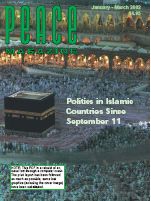
Peace Magazine Jan-Mar 2002, page 5. Some rights reserved.
Search for other articles by various here
Not all Palestinians remain peaceful as they watch Israeli settlers moving onto the land they claim, or bulldozers turning their homes into rubble. Some choose revenge and launch suicide attacks against Israel, similar in intent to those we have just witnessed on the United States.
Israeli settlements are not the single cause of terrorist attacks Israel or abroad, but they are part of that equation. Would hatred against Israel and the United States be so intense if Palestinians had a decent chance at housing, jobs, and civil rights?
James Applegate
Vancouver
Conscientious objector Yair Halper, 18, has been sentenced to 28 days of imprisonment in Military Prison No.4 after refusing to enlist in the Israeli army. He will refuse to wear military uniform in prison and will be held in the isolation ward , which is not solitary confinement, but where there is mistreatment of prisoners by wardens.
Before going to prison, Yair stated, "Every soldier con-tributes in his/her way to the perpetuation of disregard for Palestinian human rights and the continuing fortification and confirmation of Military Israel.... I know of only one way to live my life and that is by holding fast to my beliefs and principles and living by what they dictate to me."
Sergeiy Sandler
Jerusalem
Six Nobel Peace Prize Laureates have written an open letter to the University of Virginia Board of Visitors calling on the administration to divest its holding in Unocal, a California-based oil company. The letter supports resolutions passed by the UVA Student Council which called for the UVA Board of Visitors to divest the University's 50,000 shares of stock in Unocal on account of the company's complicity in human rights abuses in Burma. "While Unocal turns its back on the conditions surrounding its pipeline, its partners, the illegal military junta, are torturing, killing, raping, and enslaving thousands of people," read the letter, which was signed by Betty Williams (Ireland, 1976), Oscar Arias (Costa Rica, 1986), His Holiness, The Dalai Lama (Tibet, 1989), Rigoberta Menchu Tum (Guatemala, 1992), Jose Ramos Horta (East Timor, 1996), and Jody Williams (USA, 1997-International Campaign to Ban Landmines). The laureates became interested in UVA after speaking at a conference November 5-6, 1998 entitled, "Bringing Together Great Hearts and Minds." Burma's elected leader and 1991 Nobel Peace Prize winner Daw Aung San Suu Kyi attend the conference because she is under house arrest.
Jeremy Woodrum
Washington Director of the Free Burma Coalition
Congratulations for the excellent piece on Rapoport and his contribution to understanding nonco-operative behavior. You hit it right on the nail: the "tragedy of the commons" can be modeled and explained as a prisoners' dilemma. I just wish the Canadian conservative left would understand how transfer policies such as seasonal and fishing category employment insurance exacerbate that "tragedy" in natural resource exploitation: fish, timber, farmland, etc. And how these policies help keep some rural economies stagnant and dependent. The fact that we are all collectively poorer is almost irrelevant compared to these concerns and issues of bio-diversity.
As for TIT-FOR-TAT strategies, what we are witnessing in Israel/What-is-left-of-Palestine doesn't leave me feeling optimistic about a cooperative and socially beneficial outcome. But you are theoretically right, the threat of punishment can enforce a co-operative solution in an the future too highly.
The Israeli economy would benefit from a truly lasting and sustainable peace. The Palestinian economy is an-other matter, as much infrastructure has been destroyed by the Israeli Occupation Forces (IOF). But ethnic-cleansers in Israel know that they can count on political, military and economic support from Canada and the US, as well as propaganda from media such as CanWest and Southam News.
Erik Poole
Burnaby B.C
Terrorism underscores the tragic consequences of seeing the other person, the other society, as separate. Recognition of commonality starts in child-hood and is instilled by such social instruments as a nation's Pledge of Allegiance. I submit that it is now time to expand a sense of connection worldwide with a World Pledge:
"I am part of a vital unity linking me with all humanity and humanity with all life and will act accordingly so that each may prosper and all may continue."
Bill Sander

Peace Magazine Jan-Mar 2002, page 5. Some rights reserved.
Search for other articles by various here